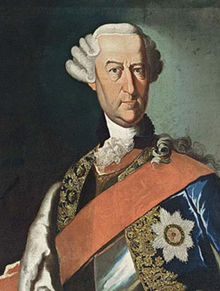| Philip of Hesse-Darmstadt | |
|---|---|
 | |
| Born | (1671-07-20)20 July 1671 Darmstadt, Landgraviate of Hesse-Darmstadt, Holy Roman Empire |
| Died | 11 August 1736(1736-08-11) (aged 65) Vienna, Austria |
| Spouse | Princess Marie Ernestine of Croÿ |
| Issue | Joseph, Prince-Bishop of Augsburg Princess Theodora of Hesse-Darmstadt Prince Leopold of Hesse-Darmstadt |
| House | Hesse-Darmstadt |
| Father | Louis VI, Landgrave of Hesse-Darmstadt |
| Mother | Elisabeth Dorothea of Saxe-Gotha-Altenburg |
Philip of Hesse-Darmstadt (20 July 1671 in Darmstadt – 11 August 1736 in Vienna) was a Prince of Hesse-Darmstadt, Imperial Field marshal and Governor of Mantua.
Life
Philip was a younger son of Louis VI, Landgrave of Hesse-Darmstadt (1630–1678) and his second wife Princess Elisabeth Dorothea of Saxe-Gotha-Altenburg (1640–1709), daughter of Ernest I, Duke of Saxe-Gotha and Princess Elisabeth Sophie of Saxe-Altenburg.
Philip fought for the Habsburgs in the Spanish War of Succession and became in 1708 Field Marshal and Supreme Commander of the Imperial troops in newly conquered Naples. After the war in 1714, under influence of Prince Eugene of Savoy, he became governor of the former Duchy of Mantua until his death.
Philip was a great lover of music. When he commanded the Austrian Army in Naples, he was patron of Nicola Porpora, and when he was governor of Mantua, he made Antonio Vivaldi Maestro di Cappella of his court. Vivaldi wrote the opera Tito Manlio in Philip's honor.
Marriage and issue

On 24 March 1693, in Brussels, Philip married Princess Marie Ernestine of Croÿ (1673–1714), daughter of Duke Ferdinand Joseph of Croy-Havré (1644-1694) and his wife, Countess Marie Joséphine Barbe van Halewijn de Hames (d. 1713). For this marriage, he converted to Catholicism, despite heavy protest of his mother.
They had 5 children :
- Joseph (13 January, 1699 − 20 August, 1768), Prince-Bishop of Augsburg
- Wilhelm Ludwig (6 July, 1704 - 24 July, 1704) Died in infancy
- Theodora (6 February 1706 – 23 January 1784), married in 1727 Duke Antonio Ferrante Gonzaga of Guastalla (1687–1729), no issue.
- Leopold (11 April, 1708– 27 October, 1764), Imperial Field marshal, married in 1740 Princess Enrichetta d'Este of Modena (1702–1777). They had no issue.
- Charles (23 April, 1710 - 17 June, 1710) Died young
Literature
- Andreas Räss: Die Convertiten seit der Reformation S. 467 ff.
- Alfred Arneth: Prinz Eugen von Savoyen, Wien, 1864
- Alessandro Cont, La Chiesa dei principi. Le relazioni tra Reichskirche, dinastie sovrane tedesche e stati italiani (1688-1763), preface of Elisabeth Garms-Cornides, Trento, Provincia autonoma di Trento, 2018, pp. 159–165, https://www.academia.edu/38170694/La_Chiesa_dei_principi._Le_relazioni_tra_Reichskirche_dinastie_sovrane_tedesche_e_stati_italiani_1688-1763_prefazione_di_Elisabeth_Garms-Cornides_Trento_Provincia_autonoma_di_Trento_2018
References
- Genealogie ascendante jusqu'au quatrieme degre inclusivement de tous les Rois et Princes de maisons souveraines de l'Europe actuellement vivans [Genealogy up to the fourth degree inclusive of all the Kings and Princes of sovereign houses of Europe currently living] (in French). Bourdeaux: Frederic Guillaume Birnstiel. 1768. p. 71.
- Talbot, Michael. "Vivaldi, Antonio." Grove Music Online. Oxford Music Online. Oxford University Press, accessed December 15, 2015, (subscription required), http://www.oxfordmusiconline.com/subscriber/article/grove/music/40120
- Eric Cross. "Tito Manlio." The New Grove Dictionary of Opera. Grove Music Online. Oxford Music Online. Oxford University Press, (subscription required), accessed December 28, 2015, http://www.oxfordmusiconline.com/subscriber/article/grove/music/O009614.
- "Marie Ernestine Josèphe de Croÿ, Princesse de Croÿ d'Havré : Genealogics".